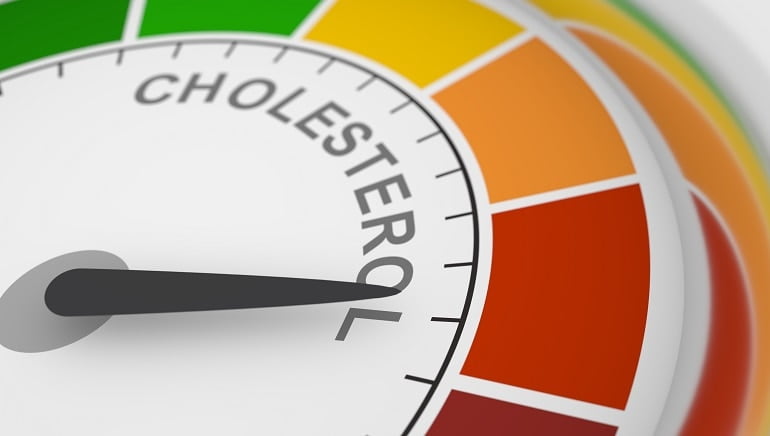High cholesterol is a health issue that can affect people of any age. If someone close to you has it, you may want to ensure keeping red meat, full-fat dairy products, fried foods, processed snacks, and sugary treats away from them. Keeping an eye on their diet is a good way to lower cholesterol, but you can do more. You might be reading up on it or talking to your friends and colleagues too. But you don’t need to believe all that they say. That’s because there are many myths and facts about high cholesterol.
To help you know the truth about cholesterol, Health Shots consulted Dr Farah Ingale , Director-Internal Medicine, Fortis Hiranandani Hospital, Vashi, Mumbai.
What is high cholesterol?
We call it high cholesterol , but experts use the term Hypercholesterolemia. It is a condition that is characterized by abnormally elevated levels of cholesterol in the blood, explains Dr Ingale. Cholesterol is a fat-like substance that found in certain foods, and is also produced by the liver. We need it for the body’s functioning as it helps to produce hormones, vitamin D, and the building of cell membranes.
If we look at the primary forms of cholesterol, there are two. One is the low-density lipoprotein (LDL) cholesterol (bad cholesterol) and the other is high-density lipoprotein (HDL) cholesterol (good cholesterol). When there is an excess of LDL in the bloodstream, it can build up on the walls of the arteries, forming plaques. That’s not good because with time, these plaques can narrow the arteries and restrict blood flow. If a plaque ruptures, it can lead to the formation of a blood clot, which can block the blood flow completely and cause serious cardiovascular problems such as heart attacks or strokes, says the expert.

Signs of high cholesterol
Most people with high cholesterol don’t really know of their condition unless they undergo a blood test to check their lipid profile. So, it’s quite sneaky that way. However, it’s important to note that high cholesterol is a significant risk factor for cardiovascular disease. If high cholesterol levels lead to the development of Atherosclerosis, it can eventually cause narrowed or blocked arteries, which can lead to various symptoms and complications. These symptoms typically manifest when the blood flow to certain organs, such as the heart or brain, becomes significantly reduced.
Some of the signs and symptoms that may arise due to complications of high cholesterol and Atherosclerosis include:
• Chest pain
• Shortness of breath
• Heart attack
• Stroke
Myths and facts about high cholesterol
Many see a connection between high cholesterol and overweight people. They think that thin or skinny people don’t have to worry about high cholesterol. Well, that’s a myth as cholesterol levels are not solely determined by body weight, says Dr Ingale. Thin people can have high cholesterol if they eat unhealthy foods, lack physical activity, or have a family history of the condition. Here are some more myths and facts:
Myth 1: Only older people need to worry about high cholesterol
Fact: While the risk of high cholesterol increases with age, it can affect people of all ages, including children. Poor lifestyle habits and certain medical conditions can contribute to high cholesterol at any age.
Myth 2: High cholesterol is always caused by eating foods
Fact: Although certain foods, such as those high in saturated and trans fats, can raise cholesterol levels, the main contributor to high cholesterol is the body’s own production of cholesterol. For most people, dietary cholesterol has little effect on blood cholesterol levels.
Myth 3: If you exercise regularly, you don’t have to deal with high cholesterol.

Fact: Regular exercise can help increase HDL cholesterol and improve overall cardiovascular health. However, exercise alone may not be enough to control high cholesterol levels. Diet and other lifestyle factors also play an important role, says the expert.
Myth 4: High cholesterol is only a risk factor for heart health.
Fact: High cholesterol is a major risk factor for heart disease, but it can also affect other blood vessels throughout the body. It increases the risk of stroke, Peripheral Artery Disease and Aortic Aneurysms.
Myth 5: If you have high cholesterol, you will experience symptoms that are obvious.
Fact: High cholesterol itself does not typically cause noticeable symptoms and is frequently diagnosed with a blood test. The symptoms that arise are usually due to complications of high cholesterol, such as heart attacks or strokes.
Myth 6: Only men need to be concerned about high cholesterol
Fact: Both men and women are at risk of high cholesterol. In fact, after menopause, women’s LDL levels tend to increase. Women should be equally vigilant about maintaining healthy cholesterol levels.
Myth 7: Medication is the only way to control high cholesterol.
Fact: While medication such as statins, may be prescribed when necessary, lifestyle changes are essential for managing high cholesterol. Adopting a healthy diet, increasing physical activity, maintaining a healthy weight, and quitting smoking can all have a positive impact on cholesterol levels.
So, while making food for your family member with high cholesterol, include more fruits, vegetables, whole grains, lean proteins such as chicken, fish, and legumes. Healthy fats like olive oil, avocados and nuts are good too. You can encourage them to engage in regular aerobic exercises, such as brisk walking, jogging, swimming, or cycling. And if there are any bad habits like smoking, tell them it’s time to five it up.

